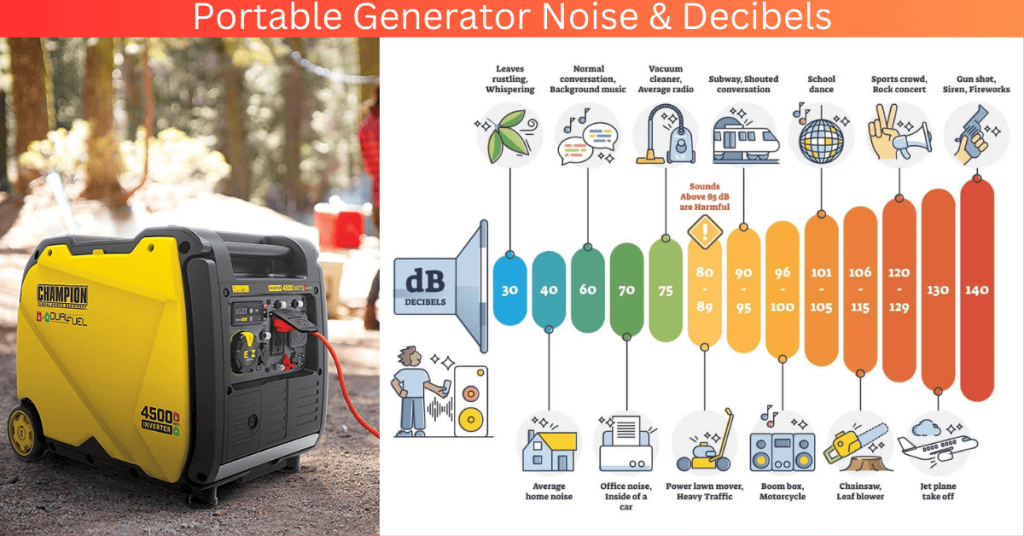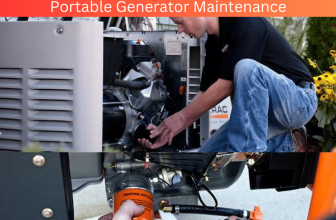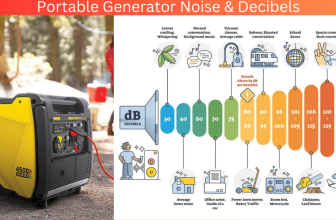Portable generators are essential for those needing reliable power during emergencies, outdoor events, or camping trips. However, one common concern is the noise levels associated with these machines.
In this blog post, we will take a closer look at portable generator noise levels and discuss ways to minimize the impact on your surroundings. We’ll cover everything from understanding decibel measurements to exploring quiet generator options and providing tips for reducing noise pollution.
Key Takeaways
- Decibel levels are used to measure the intensity of sound and impact our health and well-being when using portable generators.
- Factors that affect noise levels include engine size, exhaust technology, mufflers, and distance from the generator.
- Quieter options for portable generators include inverter generators, dual-fuel models, and enclosed generators with extra soundproofing. Choose a generator with a decibel level under 70dB and consider neighbourhood noise regulations.
- Reducing portable generator noise can be achieved by placing the generator away from people/buildings or using sound barriers like fences or walls. Lower noise levels have numerous benefits for residential areas or camping trips.

Understanding Generator Noise Levels
Decibel levels and measurements are used to understand generator noise levels, with adverse effects of high noise levels, including hearing damage, sleep disturbance, and stress.
What Are Decibel Levels And Measurements?
Decibel levels, represented by the unit dB or dB(A), are a way to quantify the intensity of sound. It’s essentially a measurement that communicates how loud or soft a sound is.
To gauge the noise level of portable generators and other devices, specialized equipment called sound level meters or decibel meters are used. These devices capture and analyze sounds in real time to accurately measure the noise being produced.
Adverse Effects Of High Noise Levels
Experiencing constant high noise levels from portable generators can lead to a myriad of adverse effects on both our health and overall well-being. One significant consequence is hearing loss, which may occur when exposed to sound levels above 85 decibels (dB) for extended periods – a common occurrence near poorly designed or old generators.
As a responsible generator owner who values their RV peace and the comfort of neighbours during power outages or camping trips, it’s essential to be aware of these risks associated with high noise pollution.
For instance, children are more susceptible than adults to hearing damage due to their developing auditory systems. This underscores the importance of selecting a quieter option like the Honda EUi series or other low-decibel portable power solutions when venturing outdoors with family members.
Finally, it’s worth considering soundproofing techniques such as enclosures and barriers that effectively minimize outdoor noise generated by your equipment while providing unobtrusive operation – preserving our physical health and fostering positive interpersonal relations within shared spaces where we all thrive together!
Standards And Regulations For Portable Generators
As a potential customer, it’s essential to be aware of the standards and regulations in place for portable generators. This ensures you choose a product that adheres to these guidelines and provides a safe and effective power solution.
In some areas, there may be local ordinances or homeowners’ association rules governing acceptable generator noise levels. These regulations ensure that residential areas maintain tranquillity even during power outages while keeping everyone safe from potential hearing damage caused by high-decibel machines.
Some countries also have specific directives focusing on reducing generator noise pollution; these include European Union Directive 2000/14/EC, which aims at improving the acoustic performance of equipment used outdoors, such as portable generators.
When searching for your ideal portable generator, take note of its decibel ratings and make sure it falls within acceptable limits established by relevant authorities or organizations in your region – ensuring a peaceful environment for you and those around you while enjoying all the benefits offered by this valuable piece of emergency preparedness equipment.
Factors That Affect Noise Levels
The noise levels of portable generators are influenced by factors such as the size and power of their engines, exhaust technology, mufflers, and distance from the generator.
Size And Power Of The Engine
The size and power of the engine are significant factors that affect the noise level of a portable generator. The larger the engine, usually the louder it will be when running.
Generators with high wattage ratings tend to have bigger engines and, as a result, can produce more noise.
For example, when I was shopping for a portable generator for my camping trips, I found that many of the larger models were just too noisy for me. So I chose a smaller inverter generator like the Honda EUi which comes with low decibel levels even at full load.
It is important to consider how you plan to use your generator before making any decisions on size or power output.
Exhaust Technology And Mufflers
One of the factors that affect noise levels in portable generators is the exhaust technology and mufflers used. The quality and design of these components can significantly reduce engine noise, making for a quieter generator.
For example, some manufacturers use advanced muffler designs to dampen sound effectively while still allowing for proper ventilation. Additionally, some generators come with spark arrestors that help mitigate exhaust noise without sacrificing performance.
Distance From The Generator
One factor that affects the noise level of your portable generator is the distance between you and the machine. The farther away you are from your generator, the less noise you’ll hear.
For example, if you’re camping in a tent and place your generator at least 50 feet away, it should be quiet enough not to disturb others around you.
It’s important to note that sound levels decrease logarithmically with increasing distance. This means that if your generator produces 70 dB at a distance of 1 meter, its sound pressure will drop to just 60 dB at a distance of 10 meters.
Quiet Portable Generator Options
You have several options for quiet portable generators, including inverter generators, dual-fuel models, and enclosed generators with extra soundproofing.
Inverter Generators
If you’re looking for a portable generator that won’t disturb your camping neighbours or runs quieter than traditional generators, then inverter generators are the way to go.
These machines use advanced technology to produce clean power with minimal noise pollution.
Inverter generators like Honda EUi have become famous for their portability and quiet operation at around 50-60 decibels (dB). This is much less than open-frame generators that can generate over 70 dB of noise while running.
Dual-fuel Generators
Dual-fuel generators are machines that can run on two types of fuel, typically gasoline and propane or natural gas. These generators provide more flexibility compared to single-fuel options and can save you money in the long run since propane is often cheaper than gasoline.
Additionally, dual-fuel options offer cleaner burning with less emissions than those powered by only one fuel type. Suppose you’re looking for a versatile generator that provides low noise output while still being powerful enough to support your needs during a power outage or when camping. In that case, a dual-fuel generator might be the perfect choice for you.
Enclosed Generators
Enclosed generators are popular for those seeking the quietest portable generator possible. These machines are built with sound-dampening materials around the engine and mufflers to reduce noise levels significantly.
Enclosed generators are often more expensive than other options but provide benefits beyond quieter operation, including better protection from environmental hazards like dust, rain, and snow.
If you’re planning a quiet camping trip or work in an area where noise levels can be problematic, an enclosed generator may be worth considering. With their lower decibel ratings compared to open steel frame alternatives, they offer peace of mind without sacrificing power output or reliability.
Tips For Choosing And Reducing Portable Generator Noise
Choose a generator with a decibel level under 70dB, consider quieter options like inverter generators or enclosed units, place the generator away from people and buildings, use sound barriers such as fences or walls to reduce noise pollution, and be mindful of neighbourhood noise regulations.
Benefits Of Lower Noise Levels
Lower noise levels from portable generators have numerous benefits, especially in residential areas or during camping trips. Not only does less noise mean more peace, but it also reduces the risk of noise-related health problems such as hearing loss and high blood pressure.
In addition to reducing noise pollution, quieter generators can increase fuel efficiency by allowing engines to run at lower speeds while providing enough power for your needs.
This can help you save money on fuel costs over time.
Neighbourhood Considerations
Living in a neighbourhood means that we have to be mindful of our neighbours. It’s important to consider the noise levels of our portable generators, especially if you plan on using them during power outages or camping trips.
Many residential areas and parks have strict rules when it comes to generator noise pollution.
To avoid complaints from your neighbours while still enjoying the benefits of a portable generator, look for models that produce lower operating noise levels, like an inverter generator or an enclosed generator.
These options are designed with quieter engines and mufflers that suppress sound effectively.
Quieter Options Available
If you’re looking for a portable generator that won’t disturb your peace, here are some options to consider:
- Inverter generators: These are generally the quietest type of portable generator available. They use advanced technology to produce clean power with minimal noise. Some popular models include the Honda EUi and the Yamaha EF2000iS.
- Dual-fuel generators: These generators can run on either gasoline or propane, which can be a more efficient and quieter fuel source. The Champion 3400-Watt Dual Fuel RV Ready Portable Inverter Generator is popular.
- Enclosed generators: Generators with an enclosed design are usually quieter than ones with an open steel frame. The Generac GP3000i Super Quiet Inverter Generator is a good example of an enclosed generator.
- Soundproofing solutions: If you already own a noisy generator, soundproofing solutions can help reduce the noise level. This includes adding foam insulation or building an enclosure around the machine.
Remember, when choosing a portable generator, always check its decibel rating and aim for one that produces less than 70dB of noise while in operation. Noise pollution can have negative impacts on both human health and the environment, so it’s important to choose wisely!
Distance And Placement
To reduce generator noise levels, it’s essential to consider the distance and placement of your portable generator. A good rule of thumb is to place the generator at least 20 feet away from your home or campsite and aim the exhaust away from living spaces.
Additionally, placing the generator on a vibration-absorbing mat can help reduce noise levels by up to 90%. If you’re camping in a quiet area or have close neighbours, it’s crucial to be respectful and keep noise levels minimal.
Opting for a quiet portable generator like Honda EUi or Yamaha EF2000iSv2 can ensure that you won’t disturb your surroundings while still having reliable power during an outage or adventure.
Enclosures And Barriers
If you’re looking to reduce the noise from your portable generator, consider using enclosures and barriers. These can help to contain the noise and direct it away from your immediate area. Here are some options to consider:
- Soundproof boxes: These can be purchased or built yourself. They work by creating a barrier around the generator that absorbs sound waves. Make sure the box is large enough for adequate airflow and cooling.
- Fences or walls: A solid fence or wall can block some of the noise from reaching neighbours. Aim for at least 6 feet in height.
- Natural barriers: Trees, bushes, or other foliage can absorb some of the noise. You can also use landscaping features to create a barrier between your generator and nearby homes.
- Distance: The farther away your generator is, the less noticeable the noise will be. Try to place it as far away as possible while still being able to access it easily.
Remember, even with enclosures and barriers; it’s important to choose a generator with a low noise level in order to minimize any disturbance for yourself or others around you.
The Impact Of Generator Noise On Health And The Environment
Prolonged exposure to loud generator noises can have negative health effects such as hearing loss, sleep disturbance, and increased stress levels.
Health Effects Of Prolonged Exposure To Loud Noise
As consumers, we often prioritize portability and power in our buying decisions for portable generators.
Prolonged exposure to loud noises from generators can lead to hearing loss, tinnitus (ringing in the ears), and even cardiovascular issues.
Excessive noise levels from generators can also increase stress levels and make it difficult to concentrate or sleep.
Environmental Concerns
As important as it is to consider the noise levels of your portable generator, it’s also crucial to think about its impact on the environment. Gas-powered generators can release harmful emissions into the air that can contribute to pollution and climate change.
If you’re planning on using a generator in an area with sensitive ecosystems or wildlife, for example, when camping or tailgating outdoors, choosing a quieter and more eco-friendly option like an electric or battery-powered generator is ideal.
Additionally, be sure to dispose of any hazardous materials properly and follow local regulations related to outdoor power equipment usage.
Conclusion
In conclusion, understanding portable generator noise levels and their impact on our health and environment is crucial. With the advancements in technology, there are now quieter options available that make camping or living with a power outage more bearable for you and your neighbours.
When choosing a portable generator, it’s essential to consider factors like size, engine power, mufflers/exhaust technology, distance from the generator, and enclosures/barriers to reduce noise levels.
Remember that generators can produce potentially harmful sounds when exceeding 70 dB(A), so always prioritize safety first.




